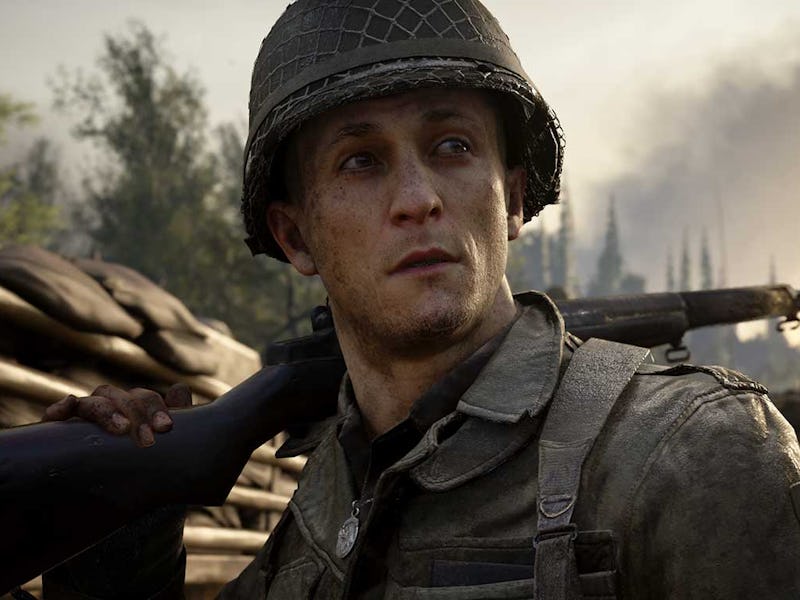Sledgehammer Games Co-Founder Reveals Why 'Call of Duty' Returned to WWII
"We re-tell these seemingly familiar stories to remind the world so that it never happens again."

The latest entry in the massively popular Call of Duty franchise abandoned recent progression towards futuristic gunplay and instead revisited its World War II roots with Call of Duty: WWII.
During a conversation with Inverse at the Call of Duty World League event held in Dallas, TX in December, Michael Condry — the co-founder and studio head at video game developer Sledgehammer Games — revealed the compelling reasons why the franchise returned to the 1940s after nearly a decade of jetpacks and more futuristic weapons.
In Call of Duty: WWII, players assume the role of a private in the 1st Infantry Division. You storm the beaches of Normandy and push forward to win the war against the Nazis. In some ways, it’s a retelling of a story that’s familiar to many of us, but Condry told Inverse that exploring the personal stories of bravery, camaraderie, and sacrifice during World War II is an exercise worth repeating for the impact it has on new generations of people around the world.
Here’s what he had to say:
Michael Condrey, Co-Founder and Studio Head of Sledgehammer Games.
The initial public announcement came in April 2017 that Call of Duty was going back to World War II. When exactly was that decision made?
Nearly three years at this point. These are big games, and they take a big team a lot of time to develop these really robust experiences. So three years in development. If you think about when that was — around 2014 — there hadn’t been a renewed interest in World War II in film just yet. We didn’t know about Dunkirk or Allied or Hacksaw Ridge.
Over the past few years, there’s been this resurgence of telling these stories that hadn’t been told in awhile.
Three years ago we sat down and talked about the opportunity to go back to World War II after nearly a decade. It was coming off of Advanced Warfare, and we could have easily have done Advanced Warfare 2, but we saw a different opportunity.
Why do you think there’s this throwback trend looking back to World War II right now?
I think it comes down to wanting to tell stories that haven’t been told in a while. We experienced that with Advanced Warfare as well. When we first started development on Advanced Warfare, the sort of near-future zeitgeist, if you will, hadn’t really blown up yet. By the time we shipped that game, there was Elysium, Edge of Tomorrow, and a bunch of films all about the near-future.
I suspect that as entertainers and creative developers, we want to tell stories that haven’t been told in a while. It was easy for the franchise to look at the Second World War because we hadn’t been there in a decade.
Even more broadly than that, the sort of iconic anchors of World War II that I knew — Saving Private Ryan 20 years ago, Band of Brothers 10 years ago — they make for a story that feels fresh in Call of Duty: WWII because of how long it’s been.
Josh Duhamel plays Sgt. William Pierson in 'Call of Duty: WWII'.
How did the team decide on what story you wanted to tell within World War II?
When you start looking back at all the stories of the War, you immediately recognize it as a global conflict. There was the European Theater, the Eastern Front, the Pacific Theater, and North Africa, right?
We wanted to tell the story of the men and women who made up one of the greatest generations, who put their lives on the line and pushed back against a world on the brink of tyranny. We felt we had to explore the European Conflict.
We engaged with a military advisor and went around the world to all these locations and talked to veterans. We did tremendous research to make sure we captured that this was going to be a story — and is — a story that honors the sacrifice, camaraderie, and bravery of those soldiers.
The first 'Call of Duty: WWII' mission has you storm the beaches of Normandy in the famous battle.
What made the team want to start at Normandy, a scene that’s so commonly featured in games and movies?
Because we were focusing on the European Theater of the War, we felt like we needed to have our take on Normandy. That was really where it all began, at least for America, so that was important to us. That battle is just iconic. And even though it’s been done before, we wanted to tell it in a Call of Duty way.
You know, I remember there was this one time, we were in Berlin, and we were standing where the Berlin Wall once was talking to the military advisors about the German view of World War II. And we talked about how there are generations of German children who don’t even remember the Wall, let alone the War. To stop and think about that, you realize how powerful that is.
It made me realize we re-tell these seemingly familiar stories to remind the world so that it never happens again. We do it for each new generation.
As you go deeper into research and you talk to historians and visit these battle sites and talk to veterans — you realize we’re telling this story because the people that were involved, those heroes, they’re not around to tell the stories themselves anymore.
So that became a really powerful creative exercise for us. I do have to say that the story of Call of Duty: WWII is the most profound and emotionally impactful campaign I’ve ever had the privilege of working on.
This interview has been edited for brevity and clarity.